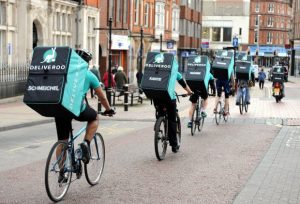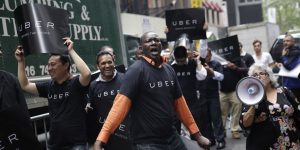They say that Uber is the largest taxi firm without owning any taxis, and AirBnB has more hotel rooms than Hilton. But after the employment court ruling that Uber needs to treat their drivers as employees, is this a game changer for everything?

Employing people is expensive, and then looking after a fleet of vehicles on top. Wow.
Yes, the Uber model is fantastic for customers – it’s not just a great price, but the value add of knowing where your taxi is, paying on credit card, the safety – but the people who are really paying for this are the drivers. It’s a race to the bottom for the drivers – some income vs no income.
Uber for its part just provide the platform for us to exploit them. And like good little citizens we have been doing. We’re lazy in our thinking – but who can blame us.
I stayed at an AirBnB a few weeks ago where I paid a fraction of the cost to that of a local hotel and stayed in a lovely double room, soft towels, fabulous view, a wonderful breakfast. But was I just exploiting the hosts desire for much needed extra cash? Or did they put their room on AirBnB because they wanted to meet new and interesting people?
Drivers and hosts are pretty much the same – for most they just want to earn money to have an existence that is slightly better than the one they had before.
Deliveroo is just the same. Apart from my annoyance with the collection of a dozen riders who congregate at lunch time and in the evening around the restaurant hot-spots of Reading (where I live), or how they assume that using the pavement as “fast-food” super highway is their God-given right – I feel sorry for them. There is so little employment p rotection for them, as we choose to eat on our sofa and ignore the business model we are simply approving the employment rights we would simply not accept for ourselves.
rotection for them, as we choose to eat on our sofa and ignore the business model we are simply approving the employment rights we would simply not accept for ourselves.
The ‘sharing’ tech platforms that provide services are under pressure – for so long they have been able to step back and say – “It’s what the people want” – both the service provider and the customer. Bringing people together, removing the “middle man” (actually swapping it for a bit of clever code and commission). And yes, they have done a pretty awesome job – but the scale of these organisations now brings a moral obligation, an obligation that many organisations they unsettled had from the start, simply, that people matter. The monopolies the business they once threaten (and in many instances have superseded) is now their very own Achilles’ heel.
But the old guard is catching up fast now with their own fantastic applications for booking rooms and rides – but the issue will always come back to cost. And if you layer the cost of treating your service provider as employees how many of the tech companies will have the expertise and business model to deal with the fall-out over the coming years?
Links
https://www.theguardian.com/technology/2016/oct/28/uber-uk-tribunal-self-employed-status
https://www.theguardian.com/society/2016/aug/14/deliveroo-told-it-must-pay-workers-minimum-wage





